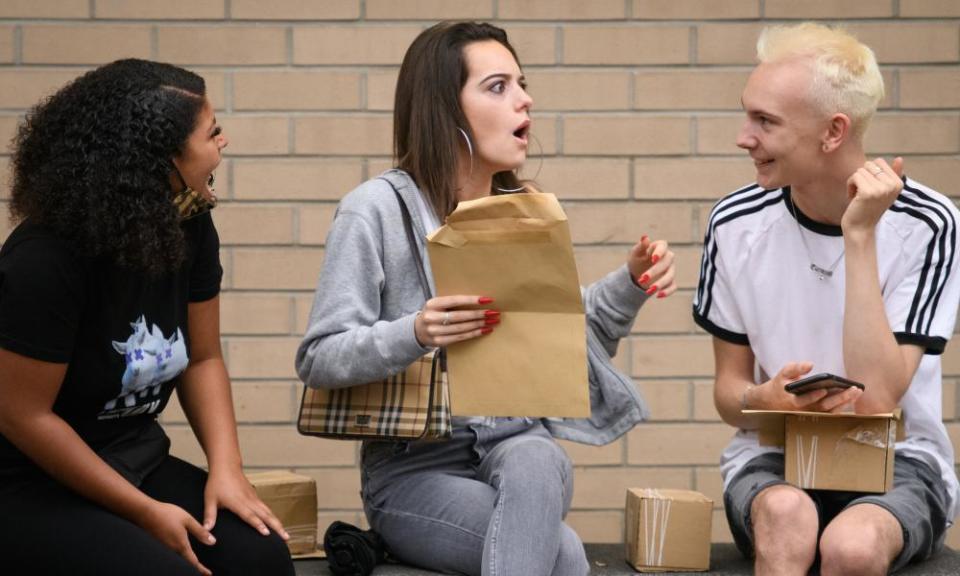Top universities accused of inflexibility over A-level downgrades

Some of the UK’s most prestigious universities have been accused of failing to show the flexibility demanded by ministers, as disappointed students in England struggled to secure places with lower A-level grades than expected.
Amid the turmoil of mass downgrades, many young people struggled to access the Ucas website and then spent hours on the phone trying to contact their chosen institutions to plead for their places, while others were summarily struck off.
The universities minister, Michelle Donelan, had urged university heads this week to be as “flexible as possible” after the cancellation of exams due to the coronavirus pandemic meant an algorithm was used to calculate A-level results for 250,000 students.
Ucas figures showed that more students were accepted on to UK degree courses this year – 415,600 from the UK and overseas, up 1.6% on the same point last year.
Among UK applicants, 358,860 have been accepted, a 2.9% rise compared with 2019, and 316,730 of these have been accepted by their first choice, up 2.7%.
But there was frustration and upset among students bewildered by downgrades.
While many lower-tariff universities sought to be as accommodating as possible – in some cases switching to unconditional offers and suggesting places on alternative courses – school and college leaders complained about less leniency in some of the more competitive institutions and on the more popular courses.
Shaz Rafiq, 17, a student at Solihull sixth-form college, was predicted ABB but was devastated to find she had been awarded CEE and now hopes to appeal. However, she has lost her place to study politics and international relations at Nottingham, a Russell Group university. “They just rejected me straight away,” she said.
Students hoping to secure places at Oxford and Cambridge were also disappointed. Helen Hopper, from Tunbridge Wells in Kent, said: “Sad day for us – my daughter was offered a place to read English at Oxford. Quite an achievement for a mixed-heritage person at state school. Far from being lenient, she dropped one grade in history and Oxford declined her. She was predicted an A and her coursework is A* in that subject.”
Dr Daveth Frost, the principal of Holy Cross College in Bury, reported widely varying responses from universities. One student who had applied to study medicine at a university in the Midlands was holding an offer of AAA, ended up with AAB and was rejected. Frost was reluctant to name the university as the student is appealing.
A second student holding a contextual offer of ABB to study medicine at Leeds University was awarded BBB and was accepted, and will be training to be a doctor from September. “In both cases they would most certainly have got much higher grades in exams,” said Frost.
“Different universities are behaving in different ways. Some are being incredibly understanding. We had a student accepted for Oxford. She got a B in one subject – which she’s never done – but all her mocks were A*. She rang up Oxford and they said ‘OK we will take you’. Others I don’t think have grasped how serious the anomalies are.”
An Oxford University spokesman said: “We intend to take every student who meets their offer grades as well as those where we consider there are mitigating circumstances for them missing their grade.
“As we do every year when grades are re-marked, some students may be offered a deferred place. Once we reach our maximum intake of undergraduates in 2020, we will have to defer entry to 2021 for any additional candidates who appeal successfully and whose place is then confirmed.”
Some school leaders reported grade requirements being lowered to allow students to take up places. William Baldwin, the principal of Brighton Hove and Sussex sixth-form college, said there were cases of students who had dropped one or two grades in the same subject still being accepted. “We are seeing evidence of universities being flexible, but within limits,” he said.
Matthew Shanks, the executive principal of Education South West, a trust with four secondaries and six primaries, was one of those to report that some Russell Group universities had not been as accommodating as others.
Headteachers said some universities were holding to original offers and not taking into account appeals for higher mock grades when accepting students.
Bill Watkin, the chief executive of the Sixth Form College Association, said: “This is a time for flexibility and sensitivity. It will be disappointing if universities fail to demonstrate these two qualities.
“There is evidence already that some universities have not shown the flexibility asked of them by the government. Some universities have already filled their places and will not wait for the outcomes of appeals, saying that even if students get the necessary grades after an appeal, they will have to defer their place until next year.”
Prof Sir Anton Muscatelli, the chair of the Russell Group, said: “It is a unique and unprecedented results season and our universities are being as flexible as possible with admissions. They are taking a range of factors into account to ensure no students, particularly those from disadvantaged backgrounds, are unfairly affected and can benefit from the world-class higher education offered by Russell Group universities.”

 Yahoo News
Yahoo News 